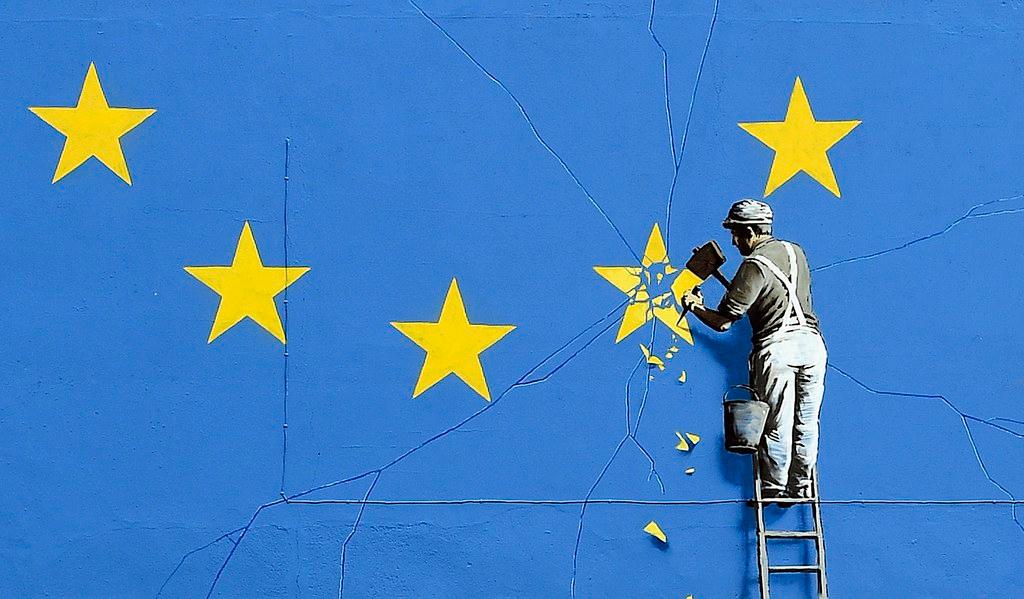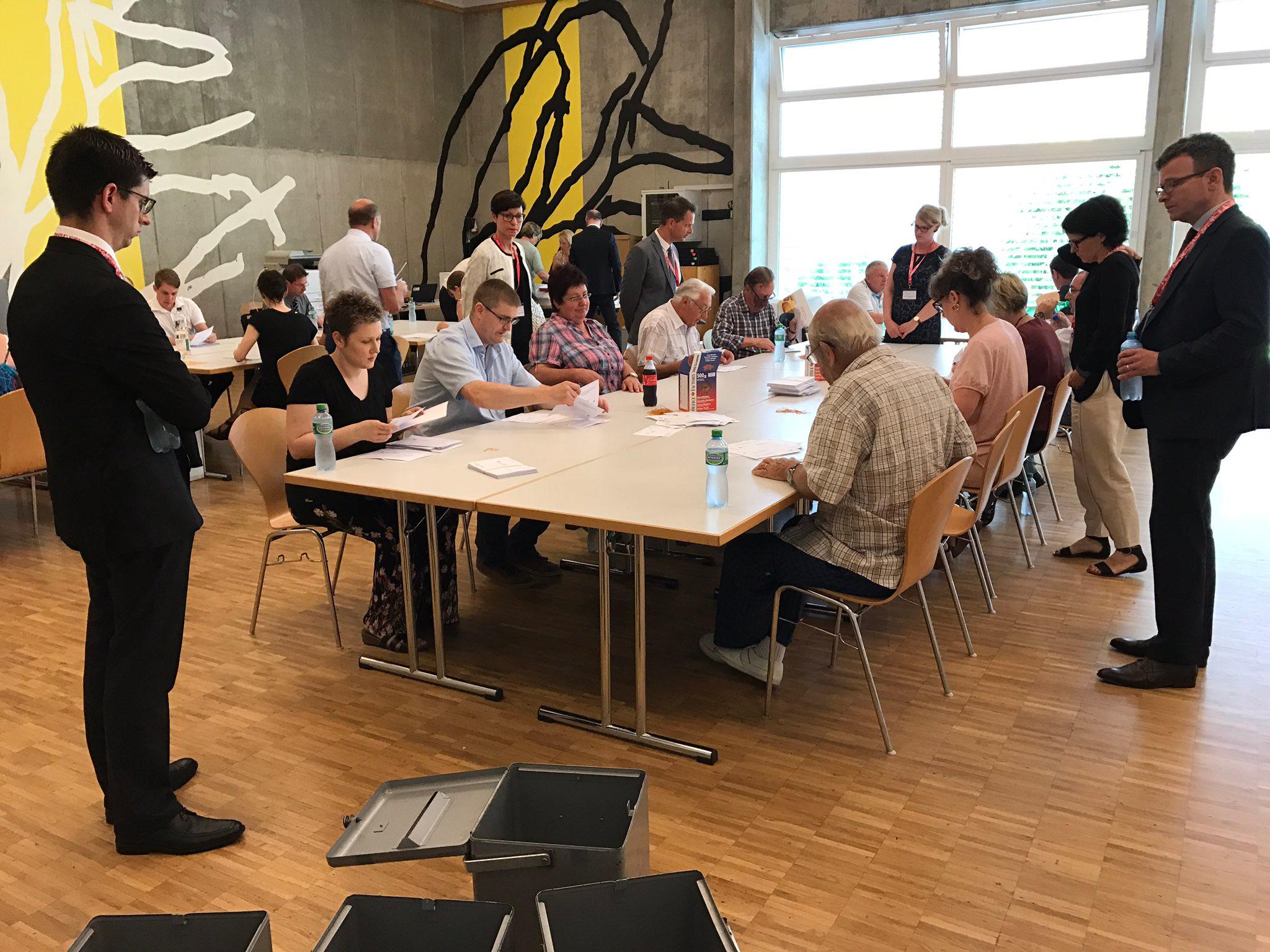Why Moutier matters more than Brexit

As two recent votes show, the democratic potential of public decisions on major issues depends on the legal design and political context under which citizens are invited to make their voices heard at the ballot box.
The votes, different in scale and impact, share some interesting similarities. One is the “Brexit” referendumExternal link on Britain’s membership in the European Union a year ago, the other a local vote in the Swiss town of Moutier last Sunday.
In a one-off advisory referendum in June 2016, 51.89% of British voters – out of about 33 million – came out in favour of their country leaving the EU. Instead of endorsing Prime Minister David Cameron and his pro-EU policy stance, the vote resulted in a serious constitutional crisis. Today, the country’s political future of the country appears uncertain and its society split down the middle, but it has been re-politicised.
On June 18, the small Swiss town of Moutier decided if it should join the French-speaking, mainly Catholic canton of Jura or remain part of Bern, a predominantly German-speaking canton with mainly Protestant residents.
This article in part of #DearDemocracy, a platform on direct democracy issues from swissinfo.ch.
A small majority – 51.7% of about 4,000 voters – opted for change and voted for Moutier to leave canton Bern. The ballot with an unusually high turnout of nearly 90% is likely to be the final stage of conflict dating back more than 200 years.
Why did one decision to “leave” create such chaos, while the other is hailed as a historic victory for modern democracy?
Nine out of ten
Popular votes on substantive issues – often just called “referendums” – are generally considered an essential feature of modern democracy, alongside regularly held elections to political offices.
In fact, more than 90% of all countries worldwide have held such issue-related popular votes in the past.

But ballot box decisions have two main limitations.
First, having the right and possibility to vote is not exclusive to a democratic system. Even in the worst dictators like to occasionally organise such electoral events, but the choice for voters is of course restricted in those cases.
In other words, the political context is crucial. The best and most organised election or referendum only produces a democratic result in free conditions.
Legal design
Second, public votes may produce unsettling results for democracy even in a free and democratic society, as the legal designs of referendums can be very different.
Most popular votes on substantive issues worldwide have a top-down approach triggered by government to bypass parliament or other state institutions.
Bottom-up forms of direct democracy, when votes are embedded within representative institutions, are still rare but are winning ground.
The Brexit vote is an example of a (politically difficult) ad-hoc top-down ballot, creating a lot of divisiveness and angry losers.
The vote in Moutier, however, is a good example of the law-governed and process-orientated form of engaging citizens in politics. The losers in the local ballot immediately and emphatically accepted the result of the vote – the latest in a series of ballots that had previously seen a different outcome.
Although the conflict has been resolved peacefully through a series of local, cantonal and national votes, the procedure over the contested Jura region in northwestern Switzerland was at times disrupted by violence.
Global outlook
So, are the tools of modern direct democracy heading the way of Moutier, or Brexit? The answer is both.
The policy approach by the British government – which indirectly also produced Prime Minister Theresa May’s current problems – has recently been shared by political leaders in Hungary and Turkey.
And it obviously didn’t stop the governments of JapanExternal link, GreeceExternal link and PolandExternal link from calling for constitutional reform referendums to strengthen their powers.
Then there is ThailandExternal link, where King Maha Vajiralongkorn launched a new constitution this spring. The move comes after a military coup in 2014 and a “referendum” last year on an early draft of the basic law.
Campaigning against such a proposal was banned in the lead-up to the vote and the new Thai constitution hasn’t been published even though it has entered into force.
There are many other current examples of highly problematic uses of popular votes on certain issues, like semi-official and often manipulated autonomy and independence “referendums” in places like South OssetiaExternal link, Nagorno-KarabakhExternal link or the Kurdish part of IraqExternal link.
Upside
But there are positive examples of initiatives and referendums benefiting citizens.
On June 11, more than 90% of voters in the Bulgarian town of TrunExternal link threw out a mining company’s plans to open a gold mine in the municipality. The vote, which was the result of a local citizens’ initiative, was welcomed by the Bulgarian president, Roumen Radev. “This shows that local democracy in Bulgaria can function successfully,” he commented on Facebook.
In neighbouring Macedonia, voters in the town of GevgelijaExternal link also forced a local ballot over a gold mine earlier this year.
These stories made headlines across the world and led to greater scrutiny of international mining companies in other countries.
Switzerland and Britain compared
On the national (and even the transnational) level, 2017 so far has seen a May 21 Swiss vote to replace nuclear energy by 2050 as well as vote on dual citizenship in the Pacific nation of MicronesiaExternal link on March 7.
A similar proposal is currently underway in LithuaniaExternal link, where the issue of dual citizenship has triggered a new debate on the form of direct democracy votes applied in the Baltic country.
Assessing the various forms and options for referendums, two young British legal experts from London and Oxford, Lea Raible and Leah TruebloodExternal link, have compared the recent use of the direct democratic tools in Britain and in Switzerland for the “Brexit” vote and in the case of Moutier.
The two researchers found evidence that purely majoritarian ad-hoc votes are incompatible with modern democracy. But they say that the Swiss system of embedded direct democracy makes representative democracy more representative. That’s why the vote in Moutier matters more to people power than the “Brexit” referendum.
This survey was written by Bruno Kaufmann with the research support of Klaus Hofmann, the editor of the Direct Democracy NavigatorExternal link.

In compliance with the JTI standards
More: SWI swissinfo.ch certified by the Journalism Trust Initiative


You can find an overview of ongoing debates with our journalists here. Please join us!
If you want to start a conversation about a topic raised in this article or want to report factual errors, email us at english@swissinfo.ch.